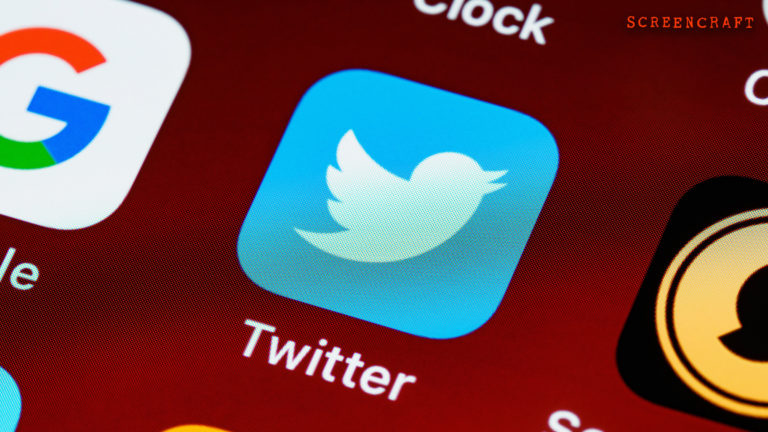
Want some great tips on pitching? Then let's head to Twitter.
Whether you're gussying up for your first meeting or still in your sweats typing up Act I, you're going to need to know how to pitch your ideas at some point in your screenwriting career. This can be pretty daunting if you don't know what to expect or what's expected of you, so let's see if we can find some practical insight from professional writers who've been to the pitching mount before.
And what better place to look than Twitter?!
Screenwriting Twitter, is full of drama and bickering a lot of the time, but it's also full of something really quite lovely: experienced pros offering free advice to aspiring screenwriters.
We gathered a bunch of our favorite tweets and threads that really give budding writers a better understanding of what to prepare for so they can make pitching their superpower.
Make Your Story Interesting to Others
Although it seems obvious, this point is probably the most important. As a screenwriter, it’s your passion to show the world your voice and what you have to say, but sometimes this passion can come at a price. Many writers become passion-blind, not realizing that their story might not be as interesting as they think, which ultimately might affect how they connect with the audience.
So you may be thinking, how do I know if other people are going to like my story? Here are some tips to remedy passion-blindness:
- Let other people read your work, then ask for their opinion on the concept.
- Make sure your story is relatable, build off of emotions that we all go through and can relate to.
- Assess your story to see if you have a unique, fresh, or interesting topic. Are you approaching a topic differently from the stories that are currently on the market?
SCREENWRITING TIP: When pitching a project, try to make them like the stuff you're saying
— Andy Compton (@andycompton_) December 11, 2021
Make Your Pitch Interesting to Others, Too
When you are selling a story, you are also selling the writer behind the story. There’s a psychological effect called the ‘halo effect’, and without getting too far into it, its basic idea is that people will have a positive outlook on what you have to say, based on what they think of you.
A pitch is a time to be very well-prepared, well-spoken, interesting, friendly, and passionate. If they initially perceive you as intelligent, interesting, and unique, they will be more inclined to invest in you and your story.
Here are some tips to sell yourself, therefore your story:
- Be prepared, know what you are going to say and how you’re going to say it.
- Bring your passion into the pitch, explain to them why you are excited about it and why others will be too. Be as passionate as Tarantino reading his script to Robert Rodriguez.
- Be an enigma, charming, cordial, and intelligent. If they think you are all of those things, they are a lot more likely to trust what you have to say.
3/ The first thing you're often pitching is getting the buyer to read you. Whether that's a query, an email, or an in-the-room pitch, you have to fascinate them and compel them to read. If they send it out for coverage, you may be doomed, so ASK THEM TO READ THEMSELVES.
— 𝙺𝚊𝚒𝚊 𝙰𝚕𝚎𝚡𝚊𝚗𝚍𝚎𝚛 (@ThisisKaia) November 2, 2021
Get to the Emotional Core of Your Story
Behind every great story, there is an emotional core, and finding that core is essential if you want to connect with production executives and audiences alike. Is your protagonist going through the motions of a story for nothing? Or do they learn something about themselves on the hero's journey? What is it that drives your story? What’s the exact dynamic that people will connect with?
Once you have answers to these questions, make sure to highlight this and focus on it. This is effectively "why" you’re telling your story; it’s what will give your story depth and separate it from being "just entertainment."
Some good answers to have at your disposal:
- What does your protagonist want and need?
- How will your audience connect to your story and relate to it?
- What lessons or moral tales does your story have?
- What’s your story's theme?
5/24 - That's my first tidbit. You're ready to pitch when you find the emotional center of the story& your connection to it. The story has to turn emotional gears in you. When they turn in you they’re gonna turn in your listener. Embrace being vulnerable and you'll pull 'em in
— Selwyn Seyfu Hinds (@selwynhinds) June 13, 2021
Prepare for a Discussion, Summary, Q&A, and Pitch
How long should your pitch be? A half an hour? 10 minutes? 20 seconds?
Short answer: yes.
You should have a version of your pitch prepared for every scenario. Hanging out with friends? Boom... 1-minute pitch. Talking with a colleague who makes indie films? Boom... 5-minute pitch. Standing next to Aaron Sorkin in an elevator? Boom... get that 30-second elevator pitch ready! Now, obviously, when you head into a proper meeting, you're going to have considerably more time, so don't worry about having to bulldoze your way through your pitch.
It’s a good idea to:
- Prepare to sum up your screenplay within 10 seconds, 60 seconds, 10 minutes, and 20 minutes+.
- Make sure to prepare answers for fundamental questions you may get asked.
- Prepare for a casual discussion with good answers for such questions as: ‘Why did you start this project? What are you trying to say with this story? How many other scripts have you written? What other scripts or projects have you worked on? Etc.
You should have all those versions avail in your head. Should be able to talk about it for 20 min, or summarize in 60 secs. Generally, they give you an hour for your mtg. 10 min chit chat beforehand, 20 min for pitch, then time for Q&A. And you wanna leave with time to spare...
— Shannon & Swift (@shannonandswift) November 2, 2019
Be Calm, Collected, and Confident
Having clear, engaging, and confident presentational skills can really help with what you are saying. It makes people see that you really believe in what you are talking about, which might make them more willing to believe in it too.
Being confident isn’t necessarily all about putting on a show, it’s most importantly about knowing what you are talking about. Lack of information and preparation almost always leads to a lack of confidence. On that note, here are some things you can do to be more confident in your pitch:
- Prepare, prepare, prepare!
- Take part in pitching events and competitions, to gain some real-world experience.
- Look into techniques you can use to effectively communicate with your words and body language.
- Be prepared for questions you may get asked in your pitch.
Hollywood is often a place full of nervous, erratic energy. Being CALM can have a gravitational pull because sometimes you might be the only calm person in the process. Demonstrating that part of your nature, that calm facility with storytelling, can be very helpful.
— Hilluminati (@bryanedwardhill) July 22, 2020
Conclusion
With these tips, you should be able to prepare a pretty decent pitch, but you should really check out the "Screenwriting" topic on Twitter for more insight from working writers.
If you want more advice on pitching, check out the topic on our blog!
 Alex Edge has worked for companies such as MTV, Nickelodeon, and Comedy Central. His roles and specialties in these companies lie in production and script consultancy. He currently works at Screenwriters Network as a director, reading and writing scripts whenever he can!
Alex Edge has worked for companies such as MTV, Nickelodeon, and Comedy Central. His roles and specialties in these companies lie in production and script consultancy. He currently works at Screenwriters Network as a director, reading and writing scripts whenever he can!
Get Our Screenwriting Newsletter!
Get weekly writing inspiration delivered to your inbox - including industry news, popular articles, and more!



























